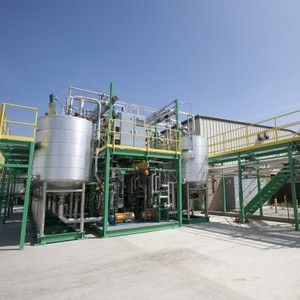Flint Hills achieves EPA approval for use of Edeniq technology

Edeniq Inc.
December 20, 2016
BY Edeniq Inc.
Edeniq Inc., a leading cellulosic and biorefining technology company, recently announced that the U.S. EPA approved Flint Hills Resources’ registration of its 120 MGPY Shell Rock, Iowa, ethanol plant for cellulosic ethanol production using Edeniq’s Pathway Technology.
Shell Rock is the second plant to receive a cellulosic ethanol registration from the EPA after deploying Edeniq’s Pathway Technology. Pacific Ethanol’s Stockton plant received its cellulosic ethanol registration in September.
Advertisement
Advertisement
“We are greatly encouraged by the EPA’s rapid approval of this second registration,” said Brian Thome, President and CEO of Edeniq. “We are excited that a growing number of our customers are generating cellulosic ethanol, transforming the ethanol industry and benefiting our country.”
“Our goal is to create as much value out of every kernel of corn as possible,” said Jeremy Bezdek, Flint Hills Resources’ vice president of biofuels and ingredients. “The Edeniq Pathway technology helps increase ethanol yields and corn oil recovery, and allows us to produce cellulosic ethanol. We appreciate the strong partnership Flint Hills has with Edeniq and look forward to evaluating the potential use of the Pathway technology at our other plants.”
Advertisement
Advertisement
“We would like to thank the Flint Hills team for their ongoing support as we position ourselves as the leader in the cellulosic ethanol industry,” said Cam Cast, chief operating officer of Edeniq. “Our team is working diligently to move plants through commercial trials and the EPA cellulosic ethanol registration process as quickly as possible despite a growing backlog.”
Edeniq’s Pathway Technology is the lowest-cost solution for producing cellulosic ethanol from corn kernel fiber utilizing existing fermenters at corn ethanol plants. Edeniq is the leader in developing analytical methods to quantify cellulosic ethanol co-produced with conventional ethanol during fermentation, which is required for EPA registration.
Related Stories
The U.S. Energy Information Administration maintained its forecast for 2025 and 2026 biodiesel, renewable diesel and sustainable aviation fuel (SAF) production in its latest Short-Term Energy Outlook, released July 8.
XCF Global Inc. on July 10 shared its strategic plan to invest close to $1 billion in developing a network of SAF production facilities, expanding its U.S. footprint, and advancing its international growth strategy.
U.S. fuel ethanol capacity fell slightly in April, while biodiesel and renewable diesel capacity held steady, according to data released by the U.S. EIA on June 30. Feedstock consumption was down when compared to the previous month.
XCF Global Inc. on July 8 provided a production update on its flagship New Rise Reno facility, underscoring that the plant has successfully produced SAF, renewable diesel, and renewable naphtha during its initial ramp-up.
The USDA’s Risk Management Agency is implementing multiple changes to the Camelina pilot insurance program for the 2026 and succeeding crop years. The changes will expand coverage options and provide greater flexibility for producers.
Upcoming Events










